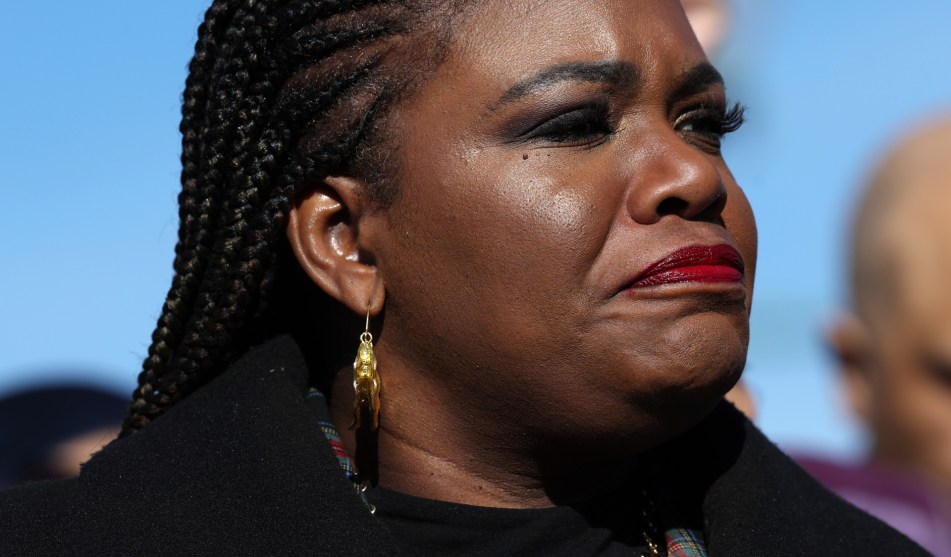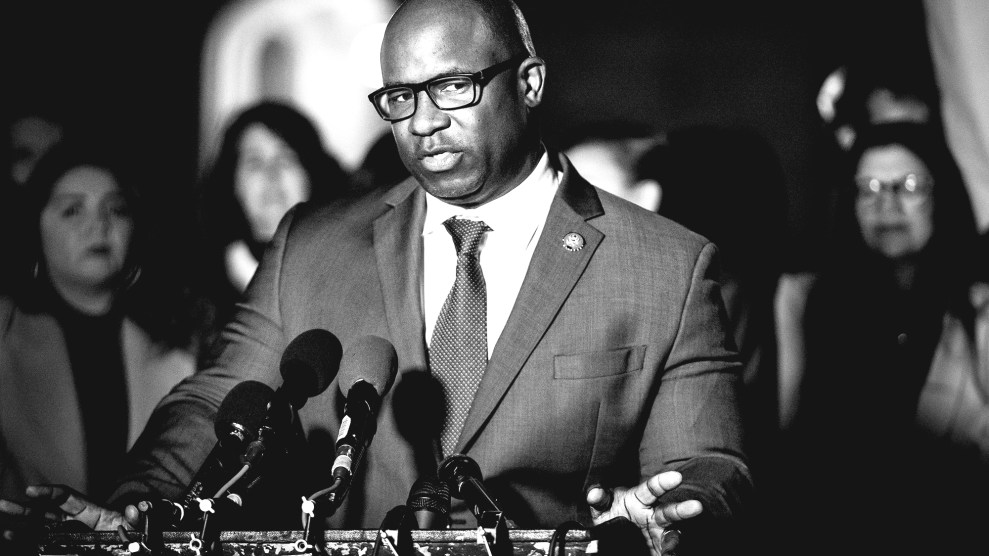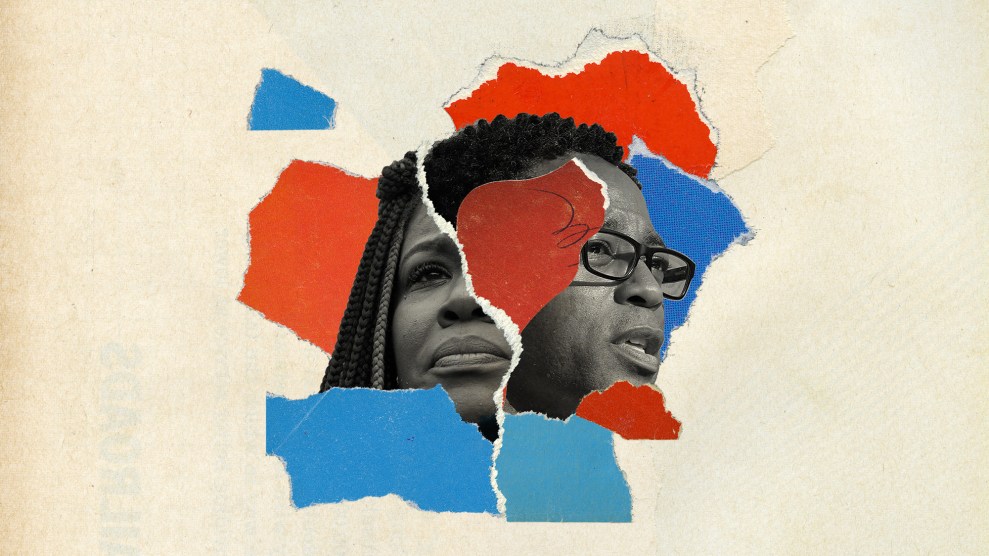
Kevin Dietsch/Getty
On her 48th birthday, Rep. Cori Bush (D-Mo.) celebrated by campaigning. Yes, there was cake, and there was singing, and there was a DJ, but there was also—a little under three weeks out from a heated Democratic primary—canvassing in the sweltering heat.
The primary has been cast as another test of how the Democrat Party responds to Israel’s war on Gaza. Bush, a member of the Squad, has been among the loudest voices calling for America to push harder for a ceasefire. United Democracy Project—a super-PAC affiliated with the American Israel Public Affairs Committee—has spent more than $7 million against Bush. The MO-01 race is already the fifth-most-expensive House primary in US history.
Late last year, St. Louis County Prosecuting Attorney Wesley Bell dropped out of his bid to dethrone Republican Sen. Josh Hawley of Missouri to challenge Bush. Some speculated he was recruited by AIPAC. A recently leaked phone call between Bush and Bell published by Drop Site News shows Bell promising he would not run against her: “I’m telling you on my word I am not running against you. That is not happening,” Bell is reported to have said. Four months later, he changed his mind.
Despite both coming of age as politicians during Ferguson—and despite the fact that in their campaign literature, both candidates label themselves the “real progressive” here—Bell’s challenge is firmly from the center. “He’s going to run as a Biden Democrat…as a Democratic team player,” Missouri Independent columnist Jeff Smith, a former state senator who used to represent parts of Bush’s district, told us in early 2024. “There’s a constituency for that, in particular among older voters, white and Black.”
After the defeat of Rep. Jamaal Bowman (D-N.Y.) by an AIPAC-funded challenger in New York, many are worried. Will Bush be the latest member of the Squad to lose? The race is shaping up to define how Democrats deal with both post-Ferguson politics and members vocal against the party’s mostly uncritical support of Israel.
Bush’s political career was born in the streets of Ferguson, fighting against police brutality. Her staunch advocacy for a ceasefire, years later, brings those same values beyond US borders. “St. Louis is my priority, but the world is also on my back, and in my head and in my heart,” Bush said at a rally. Those values carried her to an easy reelection in 2020. But now, as the party drifts back to the right, she might be punished for them.
On the muggy late-July afternoon when Bush gathered supporters, friends, and family members in a park pavilion decorated in her signature purple for her birthday, guests buzzed over the news that, only hours earlier, President Joe Biden had dropped his bid for reelection.
“Today was a gift to us,” Alderwoman Alisha Sonnier, a friend of Bush’s from her Ferguson days, told the crowd.
Earlier that week, Bush had told reporters that most calls to her office lately were requests for Biden to step down. While Bush herself didn’t join the chorus of voices calling for Biden to go, she didn’t push for the president to stay in the race as loudly as other Congress members either. “Of course, her opponent jumped on that, and said this was an example of her being anti-Democratic,” Sonnier said.
“Cori Bush is desperate to talk about anything other than how she has failed the people of Missouri’s 1st congressional district,” Jordan Sanders, Bell’s campaign manager, told me in late June. “Wesley will continue talking with voters about why St. Louis needs a progressive champion who will work with, not against, President Biden on delivering his agenda.”
This line has been typical of the attacks on Bush. Bell has campaigned not only against her stance on Gaza but also asserted that her constituent services are lacking, that she hasn’t passed enough bills, and that she hasn’t been willing to work with Biden. AIPAC-funded ads have made similar points. (This is the usual state of play; the group does not often fund ads that are attacks on a candidate’s policies on Israel. Instead, it helps the challenger win on other issues.)
The money could be working. In February, a poll released by the blog Missouri Scout, in collaboration with Republican polling firm Remington Research, showed Bush trailing Bell by 22 points. But people on the ground are not confident that the race for Missouri’s 1st District is a foregone conclusion. President of the Board of Aldermen Megan Green told me the Remington Research poll is not indicative of Bush’s support on the ground—because the group has been under-polling progressives for years. “That same poll has had me far behind, when I ended up winning by 12 points against my opponent,” she said.
Other polls have shown a tighter race. Democratic Majority for Israel, an AIPAC-affiliated group, has run multiple surveys since Remington’s. Both polls show Bell and Bush close, with Bell in the lead. The latest DMFI poll, which sampled 400 residents—but did not provide details about its methodology—finds Bell with a six-point edge over Bush.
“It’s not a shoe-in, and it’s really hard to predict,” longtime Jennings city Council member Terry Wilson puts it. “But [if] anybody was to beat [Bush], I’d say he had a pretty good shot at it.”
Bell and Bush both found political careers in the aftermath of the Ferguson uprising, a protest movement that began 10 years ago this August when white police officer Darren Wilson killed unarmed Black teenager Mike Brown. Bush’s district contains just under half of Missouri’s entire Black population. The legacy of Ferguson has played a large part in influencing the outcome of mayoral, prosecutorial, and congressional races for the past decade here.
In 2018, Bell, previously a Ferguson City Council member, ran for St. Louis county prosecutor on the promise of overturning unjust convictions and perhaps reopening the case against Wilson. He won. But just like his conservative predecessor, he did not charge Wilson.
Bush took a different path to elected office. She was a protest stalwart back in Ferguson in 2014—showing up in the streets again and again as subsequent waves of anti-police-brutality protests bubbled over the next six years. She positioned herself as a community organizer, calling herself a “politivist”—a slightly hard-to-grasp portmanteau of politician and activist. In 2020, she defeated William Lacy Clay, a part of the 52-year Clay family congressional dynasty.
This has earned her trust. Mike Brown’s family recently appeared in a Bush campaign advertisement to differentiate her activism from her opponent’s: “Wesley Bell…used my family for power, and now he’s trying to sell out St. Louis,” Michael Brown Sr. tells the camera.
And rapper Tef Poe released a diss track laying out what he sees as a betrayal by Bell, over the beat of Kendrick Lamar’s “Not Like Us.”
“Can’t even walk through the Loop / you a sellout to the Lou,” the former Ferguson activist says, referencing the downtown area in St. Louis. “Shoulda reopened that case, but you a disgrace and ain’t even tried.”
Since her election to Congress in 2021, Bush has become one of the most outspoken members on the left, pushing for an eviction moratorium and the restoration of abortion rights.
In 2022, she won 70 percent of the vote. Since then, she has upped her finances and has received some celebrity donors. Kyrie Irving—a sometimes controversial basketball star who does not ordinarily involve himself in congressional races—donated the maximum legal amount to her campaign, according to FEC records. (Irving’s management did not respond to requests for comment.) Fellow Squad members Rep. Rashida Tlaib (D-Mich.) and Rep. Ayanna Pressley (D-Mass.) have come to Missouri to campaign for her. In total, Bush has raised about $2.6 million for her campaign.
That’s surpassed by Bell, who has taken out more than $12 million in ads. “I can’t turn on the TV without every commercial break being like three or four Wesley Bell ads or the same ad over and over again,” Green, the alderman, said.
But the money has courted controversy. As HuffPost reported in May, Bell has taken more than $65,000 from donors who also give to Missouri Republicans.
Some Missouri progressive groups can’t shake their concern that these donors will influence his policy positions. Abortion Action Missouri recently endorsed Bush, though they’ve endorsed Bell in previous races, and have no qualms with his record as a prosecutor around abortion.
Mallory Schwarz, the advocacy group’s executive director, said the group is “unsettled by what we have heard about some of the anti-abortion megadonors who have jumped into this race, and we question—what is their personal interest in weighing in, in our state and in our city?” Planned Parenthood of Missouri has also thrown its weight behind Bush in this contest, though they’ve endorsed Bell before. (On the two-year anniversary of the Dobbs decision, Bell tweeted that he had been endorsed by Planned Parenthood; he then quickly revised that tweet to reflect that he didn’t mean this race, but rather previous races he had run.)
On an organizing call in early June, Bush laid out how she sees the terms of this race to a small Zoom room. “My opponent was running against Josh Hawley, and now he takes money from Josh Hawley’s donors,” she said. “This is who we get if I am unseated—we get someone who goes whichever way the wind blows. We become unsafe when the people that only care about the money are the ones that take power.”

















